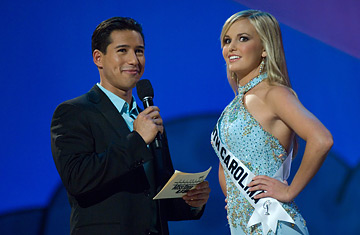
Lauren Caitlin Upton, Miss South Carolina, answers a question from host Mario Lopez, left, during the interview portion of the Miss Teen USA 2007
I have to admit that I felt some empathy for Lauren Upton, Miss Teen South Carolina and a runner-up to Miss Teen USA who became an overnight Internet sensation in August for her badly boggled and meandering answer to the question: Why can't one-fifth of Americans locate the United States on a map? I've been in the spotlight too, and I've lost my train of thought in the middle of answering a question, heard the rush of blood to my brain as I desperately tried to get back on track. I could feel her pain. But, then again, I've never answered any question with "the Iraq."
Miss Upton's answer, before it went horribly astray, started in a credible direction. She wondered if part of our geographic ineptitude was due to the fact that some "U.S. Americans" don't have maps. Good point, Lauren. I grew up with several roadmaps and atlases in my house, but when I look around today, my residence is void of any printed maps. The reason I've gone mapless is probably because I have access to amazingly detailed digital maps anytime online. So, all of this has got me thinking (no surprise) about our online geographic focus. What are we looking for? What can't we find? The answers may surprise you — and potentially help future pageant contestants should this question ever arise again.
I started my analysis by surveying the things people most want to find. To create my Internet lost and found I queried the Hitwise database for all searches that contained the terms "where is." The most popular "where is" query is a search for lyrics to the song "Where Is the Love," presumably the Black Eyed Peas version. (Catchy tune.) Over the last four weeks, that search was followed closely by searches for various small towns in Utah — Sandy, for instance — perhaps due to polygamist Warren Jeffs' recently concluded rape trial. (Guilty.) One of the most popular "where is" queries, which ranks at number six but appears repeatedly, in various forms, throughout the top 20,000 searched terms, is "where is my refund?"
Clearly we're looking for lots of things, but they're not all geographical. So, I checked our Internet usage from a different angle: what are the top searches that send traffic to the 174 mapping sites that Hitwise tracks? Once you get past basic queries for the URLs of sites like Mapquest and Yahoo! Maps, it turns out that the top searches aren't for countries, states or cities. People don't want to know where the Iraq is. Rather, the most popular search requests are for the closest "Wal-Mart," followed by "Best Buy," "Pizza Hut" and "Costco." We've zoomed in so close — we've put on blinders to the world beyond the street-by-street route to the nearest big box store — that it's hardly any wonder that 20% of our populace can't locate their own country on a map. With all of this technology, we've lost the serendipity factor that allowed past generations to expand their horizons and learn about the world simply by having an atlas open in front of them. (Not to mention books, newspapers and encyclopedias.) It seems that the desire to get lost in the world and to learn something new has been overtaken by the instant gratification of point-to-point directions.
Given that our use of mapping functions in the U.S. isn't educational but utilitarian — we consult online maps for little else but driving directions — I felt the uncontrollable urge to delve into the age-old battle-of-the-sexes issue: are men (myself included) unwilling to ask for directions even online? The answer is yes, but only slightly less so than women. The demographics of visitors to the most popular maps-and-directions website in the U.S., Mapquest, reveal that women are only 8% more likely than men to visit the site. Perhaps men are more willing than usual to ask for virtual directions because the web protects against potential embarrassment. That's a tip Miss Teen South Carolina could surely have used.
Bill Tancer is general manager of global research at Hitwise.
